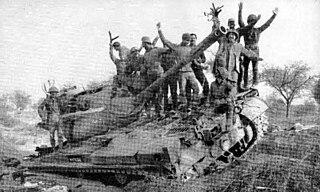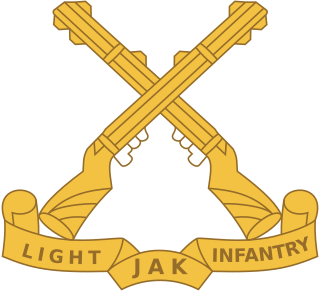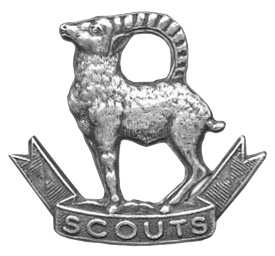
The Kumaon Regiment is one of the oldest infantry regiments of the Indian Army. The regiment traces its origins to the 18th century and has fought in every major campaign of the British Indian Army and the Indian Army, including the two world wars, and is one of the highest decorated regiments of the Indian Army.

The Battle of Basantar, also known as the Battle of Shakargarh or Battle of Barapind, was one of the vital battles fought as part of the Indo-Pakistani War of 1971 in the western sector of India. The Indian troops won a hard-fought battle that secured this area in the Punjab/Jammu sector. The name Battle of Basantar actually encompasses the entire gamut of battles and skirmishes fought in the Shakargarh sector.

The Jammu and Kashmir Light Infantry is an infantry regiment of the Indian Army. The regimental center is in Srinagar's Airport Complex at Awantipora with a winter setup near Jammu. Its regimental insignia consists of a pair of crossed rifles. The regiment mostly consists of volunteers from the state of Jammu & Kashmir and ethnic groups from the state. The Jammu and Kashmir Light Infantry is considered to be one of the most decorated regiment of the Indian army having won 1 Param Veer Chakra and 3 Ashok Chakra. Naib Subedar Chuni Lal of the 8th battalion Jammu and Kashmir Light Infantry is one of the most decorated personnel of the Indian Army.

Brigadier Kuldip Singh Chandpuri MVC, VSM was a decorated Indian Army officer. He is known for his leadership in the Battle of Longewala during the Indo-Pakistani War of 1971, for which he was awarded the Maha Vir Chakra, the second highest Indian military decoration, by the Indian government. The 1997 Hindi film Border was based on the battle, with his role played by Sunny Deol. He was a councillor in the Chandigarh Municipal Corporation from 2006 to 2011.
Major General Kulwant Singh Pannu, MVC was an officer of the Indian Army and a recipient of the Maha Vir Chakra. He was initially commissioned as an officer in the 3 Gorkha Rifles in 1952, and joined the Parachute Regiment in 1957 after completing the paratrooper officers' course. Pannu is most famous for having led 2 Para in the famous Tangail Airdrop to capture the Poongli Bridge over the River Jamuna on 11 December 1971, during the Bangladesh Liberation War. The battalion was airdropped near Tangail and tasked to cut off the 93 Brigade of Pakistani Army which was retreating from the north to defend Dhaka and its approaches. For his conspicuous gallantry and leadership, Pannu was awarded the Maha Vir Chakra.
Major Vijay Rattan Choudhry, was a soldier who served in the 9 Engineers Regiment of the Indian Army. He is an alumni of The Lawrence School, Sanawar. He was posthumously awarded the Maha Vir Chakra for bravery displayed in the Indo-Pak war of 1971.

The Ladakh Scouts is an infantry regiment of the Indian Army, nicknamed as the "Snow Warriors" or "Snow Leopards". The regiment specializes in mountain warfare, and its primary role is to guard India's borders in the high altitudes of the Union Territory of Ladakh.

Major Padmapani Acharya, MVC was an officer in the Indian Army. He was awarded the second highest Indian military honour, Maha Vir Chakra posthumously for his actions during the Kargil War on 28 June 1999.
Lance Naik Ram Ugrah Pandey, MVC was a war hero of Indo-Pakistani war of 1971. He was posthumously honored with India's second highest wartime gallantry award, Maha Vir Chakra.

Lieutenant General Raj Mohan Vohra, PVSM, MVC was a General Officer of the Indian Army. He was awarded the Maha Vir Chakra for his bravery and leadership in the Battle of Basantar during the Indo-Pakistani War of 1971.

The 54th Infantry Division is an Infantry division of the Indian Army. The Division was raised as an Infantry Division, but was converted into a Reorganised Amphibious Formation (RAMFOR) in 2011. It is currently the only division of the Indian Army which carries out Amphibious warfare. The division is headquartered at Secunderabad in Telangana and is a part of XXI Corps. The Division is commanded by an Officer of the rank of Major General titled General Officer Commanding (GOC).
Lieutenant General Ved Prakash Airy, MVC was an officer of the Indian Army, who served with the 3 Grenadiers. He is best known for his participation in the Battle of Basantar, one of the major battles of the Indo-Pakistani War of 1971, where he was awarded the Maha Vir Chakra, India's second highest award for gallantry in the face of the enemy.

Brigadier Sukhjit Singh, MVC is a former Indian Army officer who served with The Scinde Horse. He was awarded the Maha Vir Chakra, India's second highest award for gallantry, for his leadership and courage in facing the enemy during the Battle of Basantar in the Indo-Pakistani War of 1971.
Major General Harish Chandra Pathak, MVC, AVSM was an officer of the Indian Army, who belonged to the SikhLI Regiment. He was awarded the Maha Vir Chakra, India's second highest award for gallantry in the face of the enemy, during Battle of Fatehpur, Indo-Pakistan War of 1971.

Brigadier Rattan Nath Sharma, MVC, was an officer in the Indian Army who served with the Punjab Regiment, and was awarded the Maha Vir Chakra, India's second-highest award for gallantry in the face of the enemy. The award was made for his actions during the Indo-Pakistani War of 1971, when he displayed exemplary courage and outstanding leadership while commanding the 21st Battalion, Punjab Regiment, in a successful assault on a fortified Pakistani position near the Poonch River in the Jammu and Kashmir sector of the Western Front. He retired from the army in 1977 as a brigadier, after which he was the chief managing director of the Indian Farmers Fertiliser Cooperative. He died in a vehicle accident in December 2011.
Brigadier Udai Singh, MVC was an officer in the Indian Army, who served with the 8th Gorkha Rifles regiment. He was awarded the Maha Vir Chakra, India's second-highest award, for his role in the Battle of Turtuk in the Indo-Pakistani War of 1971.
Major General Chittoor Venugopal PVSM, MVC was a General Officer in the Indian Army. He was decorated with the Maha Vir Chakra for his role in the Indo-Pakistani War of 1971.
Brigadier Mohindar Lal Whig, MVC was an Indian Army officer. He served with the 5th Gorkha Rifles regiment. He was awarded the Maha Vir Chakra, India's second-highest award for his role in the Indo-Pakistani War of 1971.
Brigadier Kailash Prasad Pande, MVC was an officer in the Indian Army, who served with the Regiment of Artillery. He was awarded the Maha Vir Chakra, India's second highest award for his role in the Indo-Pakistani War of 1971.

Brigadier Narinder Singh Sandhu MVC was an Indian Army officer who was awarded the Maha Vir Chakra (MVC), the second-highest Indian military decoration, for gallantry, leadership and devotion to duty during the Indo-Pakistan War of 1971. Sandhu was commissioned into the Indian Army Armoured Corps in 1953, and participated in the Battle of Asal Uttar during the Indo-Pakistani War of 1965, and was mentioned in dispatches. He transferred to the Dogra Regiment in 1970, and it was for his performance as commanding officer of the 10th Battalion, Dogra Regiment during an assault on a fortified Pakistan Army position that he was awarded the MVC. He retired as a brigadier and was active in veterans' and gallantry award recipients' matters until his death of colorectal cancer in 2018.










